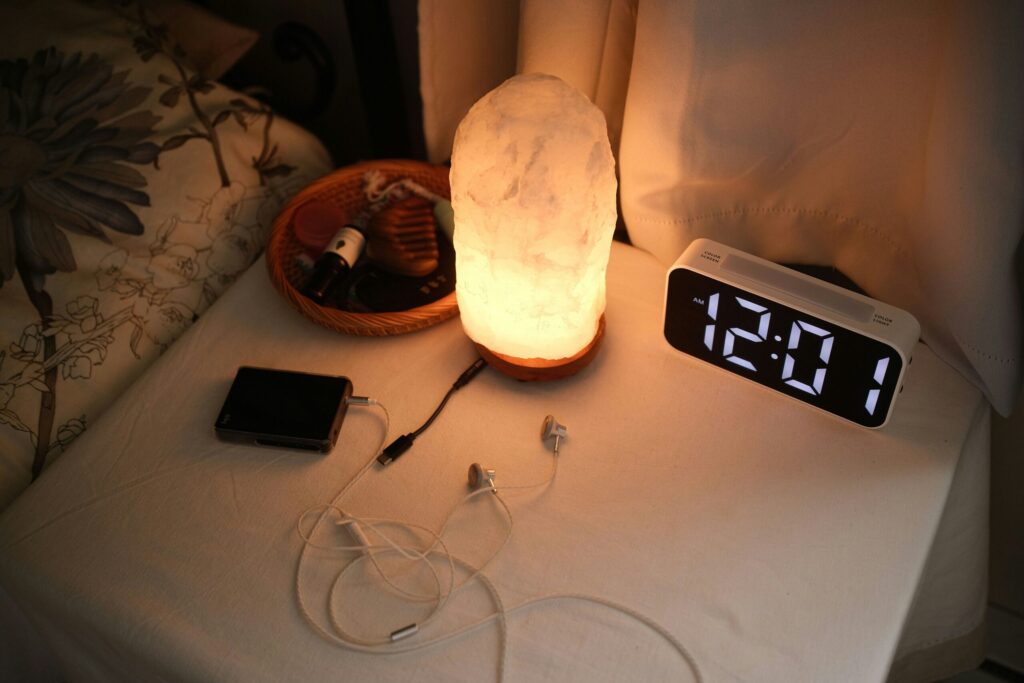Science-Backed Ways to Improve Sleep and Ease Insomnia
Insomnia isn’t just about not being able to fall asleep—it’s when your body and brain remain tense and fail to relax. In this post, we’ll explore the physiological causes of insomnia, scientifically proven sleep-inducing methods, helpful foods, and daily habits that improve rest. I’ll also share personal routines that helped me overcome sleepless nights.
1. Physiological Causes of Insomnia

- Blue light exposure: The blue light from phones and computer screens suppresses melatonin secretion.
- Stress: Dominance of the sympathetic nervous system prevents the body from entering relaxation mode.
- Irregular rhythm: Inconsistent sleep and wake times disrupt the body’s internal clock.
These insomnia sleep routines are designed to help your body and mind relax naturally before bedtime. By following a consistent insomnia sleep routine, your brain learns when it’s time to rest.
2. Scientifically Proven Sleep-Inducing Methods
2-1) The 4-7-8 Breathing Technique
How to do it: Inhale through your nose for 4 seconds → hold for 7 seconds → exhale slowly through your mouth for 8 seconds. Repeat 4–8 times.
Why it works: Slow exhalation stimulates the vagus nerve, activating the parasympathetic system and reducing heart rate and blood pressure.
2-2) Body Temperature & Lighting
- Cooling signal: Take a lukewarm shower or foot bath about an hour before bed—your core body temperature drops as you dry off, strengthening the sleep signal.
- Lighting: Use only soft yellow indirect lights and reduce brightness. Switch your screens to blue-light filter mode.
2-3) Scent & Sound
- Aromas: Lavender, bergamot, and chamomile have been shown to improve perceived sleep quality.
- Sound: Calm voices or white noise reduce intrusive thoughts and create a steady rhythm for relaxation.
Each insomnia sleep routine focuses on balancing breathing, lighting, and body temperature to make falling asleep easier. This process supports natural melatonin production and calms the nervous system.
Reference: American Academy of Sleep Medicine
3. Foods That Help Relieve Insomnia
| Category | Food | Key Nutrients | Description |
|---|---|---|---|
| Tryptophan-rich foods | Banana, milk, tofu | Tryptophan → Serotonin → Melatonin | Helps melatonin production. Avoid overeating. |
| Magnesium foods | Almonds, spinach, pumpkin seeds | Magnesium | Promotes muscle relaxation and nerve calmness. |
| Complex carbohydrates | Oats, brown rice | Sustained satiety | Prevents blood sugar spikes and stabilizes mood. |
| Herbal tea | Chamomile, rooibos | Apigenin, etc. | Relieves tension and promotes calmness without caffeine. |
Avoid before bed: Caffeine (coffee, energy drinks, green tea), nicotine, and alcohol within 6 hours of bedtime as they disrupt deep sleep.
4. Routine That Actually Worked for Me

I used to lie in bed trying to force myself to sleep, but it only made me more awake.
So I changed my approach—I focused on simply resting. I’d turn on a relaxing podcast or game commentary and just stay still until my body naturally relaxed.
Once I let go of the pressure to “fall asleep,” it came much more easily.Often, insomnia is caused by the pressure of “needing to sleep.” Just realizing your body is resting, keeping a simple nightly routine, and staying away from your phone can calm the nervous system and improve sleep quality.
Practicing an insomnia sleep routine every night can help rebuild your sleep rhythm and reduce anxiety about falling asleep. Over time, sleep becomes smoother and more refreshing.
5. Daily Habits to Improve Sleep Quality
- Keep a consistent wake-up time—even on weekends.
- Get at least 20 minutes of sunlight exposure during the day to regulate circadian rhythm.
- Reduce caffeine intake after 2 p.m.
- Avoid heavy meals before bed; try light stretching or a short walk instead.
- Before sleep, write down tomorrow’s tasks and focus on physical sensations rather than overthinking.
Insomnia can be a signal that your body and mind are still in “daytime mode.” Adjusting your lighting, body temperature, breathing, diet, and routine can restore your natural sleep rhythm. Don’t force sleep—create a comfortable space to rest, and sleep will come naturally once your body feels at ease.
Struggling with low focus during the day? Check out our science-backed guide on Focus Reset Routines to recharge your mind and boost productivity naturally.



